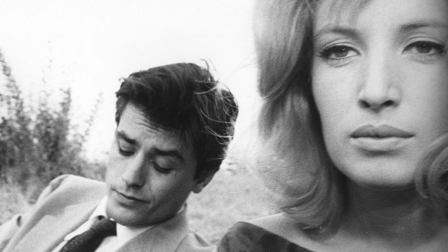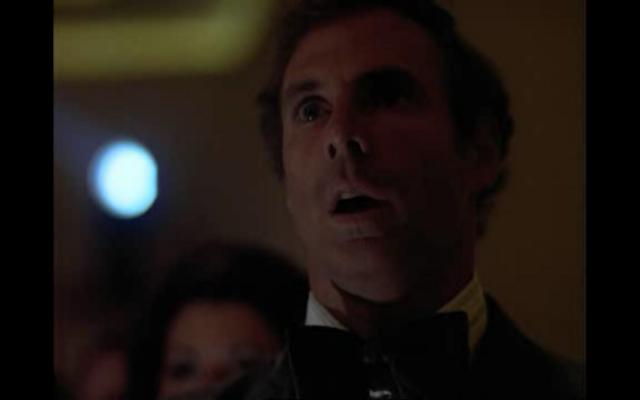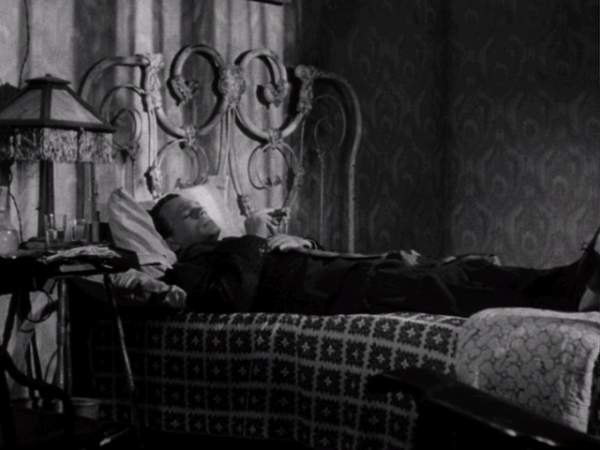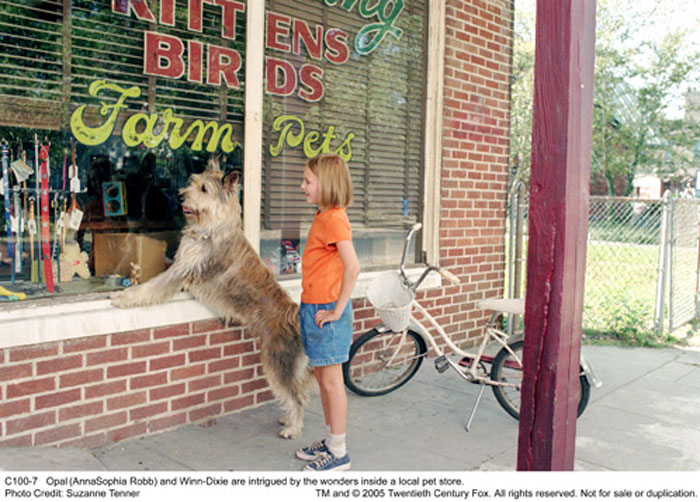A 2005 essay commissioned by Criterion for their DVD of Eclipse. — J.R.
Your vigilance as an artist is an amorous vigilance, a vigilance of desire.
— Roland Barthes to Michelangelo Antonioni, 1979

It’s lamentable that Michelangelo Antonioni, one of the most fashionable vanguard European filmmakers during the sixties, has mainly been out of fashion ever since. Part of this may be due to the sixties themselves — an era of artistic innovation when making ambitious films about the zeitgeist was still considered both possible and desirable — and all they’ve come to represent in ensuing decades. It seems that the curiosity and metaphysical doubts about the world, which resemble at times agnosticism about reality itself, are more easily tolerated when the glamour of that world is more readily apparent.
This was a time when intellectual activity about the zeitgeist could be debated, if not always welcomed, with Godard and Antonioni the two most commanding figureheads. L’eclisse (1962) appeared the year after Chronicle of a Summer, Last Year at Marienbad, and Paris Belongs to Us, the same year as The Exterminating Angel and Vivre sa vie, and the year before Contempt and Muriel — a period, in short, when large statements and narrative innovations often came together. Read more
From Monthly Film Bulletin, Vol. 42, No. 501, October 1975. — J.R.

Smile
U.S.A., 1974Director: Michael Ritchie

Thirty-three high school girls arrive in Santa Rosa, California, to compete in the annual Young American Miss Pageant. While the girls rehearse their individual and collective performances and are interviewed by a panel of judges — including former pageant winner Brenda DiCarlo [Barbara Feldon] and car dealer “Big Bob” Freelander [Bruce Dern], who codirect the event – Brenda’s husband Andy [Nicholas Pryor], a heavy drinker who runs a trophy shop, derides the silliness of the pageant and Freelander’s son, “Little Bob” [Eric Shea], takes orders from his friends for Polaroid nude snapshots of the girls. Professional choreographer Tommy French [Michael Kidd] arrives to train the girls in dance routines, “Little Bob” his caught with his Polaroid while the girls are undressing, a nude snapshot is confiscated by the police, and he is taken to see a psychiatrist by his father. Andy complains to “big Bob” about his sexual problems with Brenda, and is reluctantly persuaded to attend the Exhausted Rooster Ceremony (for local men who reach the age of 35) that night, the second evening of the pageant. Read more


For me, the most valuable single piece of film criticism by François Truffaut — the one that has taught me the most — is a fairly early one, “Un Trousseau de fausses clés,” about Alfred Hitchcock, that appeared in Cahiers du Cinéma no. 39, octobre 1954. I first encountered this article in an English translation (“Skeleton Keys”) that appeared in Film Culture (Spring 1964), then in Cahiers du Cinéma in English No. 2, 1966. I find it far more ingenious as well as useful as criticism than Truffaut’s over- fetishized “Une Certaine Tendance of Cinema Française,” and the part I remember best (I don’t have a copy handy, but trust my memory on this) is a detailed analysis of Hitchcock’s Shadow of a Doubt in terms of “rhyming” shots and scenes, such as the two reproduced above. Many of these visual/ thematic rhymes involve the film’s two Charlies, a serial murderer of women (Joseph Cotten) and his young and beloved niece (Teresa Wright).
This is an essay that clearly helped to spawn Godard’s own best (and most detailed) work of film criticism — “Le cinéma et son double,” about Hitchcock’s The Wrong Man — as well as the structure of doubling shots and scenes in Rivette’s Céline et Julie vont en bateau. Read more
From the Chicago Reader (February 18, 2005). — J.R.


Uncle Nino
** (Worth seeing)
Directed and written by Bob Shallcross
With Joe Mantegna, Pierrino Mascarino, Anne Archer, Trevor Morgan, and Gina Mantegna
Because of Winn-Dixie
** (Worth seeing)
Directed by Wayne Wang
Written by Joan Singleton
With AnnaSophia Robb, Jeff Daniels, Cicely Tyson, Dave Matthews, and Eva Marie Saint
An uninvited guest joins an already stressed household, causing pandemonium and upsetting the neighbors as well. The preoccupied, absentminded father assumes this obstreperous if good-natured invader is visiting only temporarily, but on and on he stays, irritating almost everyone apart from the young daughter. Eventually the interloper wins everyone over and brings them all together.
That’s the familiar plot of not one but two current commercial releases, both wholesome family pictures. The visitor in Uncle Nino, which opened last week, is the title hero (Pierrino Mascarino), an elderly Italian peasant with a minimal knowledge of English who flies to the U.S. to visit the family of his nephew Robert (Joe Mantegna) after his brother, Robert’s father, dies. The visitor in Because of Winn-Dixie, which opens this week, is also the title hero, a stray dog in a small town in southern bayou country that’s taken in by the ten-year-old heroine, Opal (AnnaSophia Robb), the daughter of a Baptist preacher (Jeff Daniels). Read more







